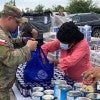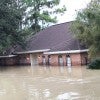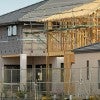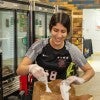
Attitudes Toward Mass Deportation and Immigration Policy Preferences
Nearly 10,000 residents were surveyed regarding their preferences for various immigration policies, including mass deportation.

Attitudes Toward Mass Deportation and Immigration Policy Preferences
Nearly 10,000 residents were surveyed regarding their preferences for various immigration policies, including mass deportation.

Food Insecurity in Houston and Harris County
About 2 in 5 Houston and Harris County households are food insecure, nearly three times the national average.

This study examines the short- and long-term recovery of Houston-area residents following Hurricane Beryl and other severe weather events occuring between April and July 2024.

How researching with mothers — not just about them — can produce better solutions
Houston faces significant maternal health challenges, but the best solutions often come from the people dealing with them every day.

Understanding Shifting Demographics in Early Education
This event will focus on the changing demographic composition of the Greater Houston region and what these trends mean for the schools, districts and organizations providing support to an evolving student population.

Hurricane Beryl: Community Response and Resilience
This snapshot looks at early recovery efforts and feelings of resilience among Houston and Harris County residents after Hurricane Beryl.
![Paths [Senderos]](/sites/g/files/bxs4896/files/styles/thumbnail_100x100_fixed/public/2025-07/Paths%20%5BSenderos%5D.jpg?itok=e3xX5Of-)
This project aims to adapt the existing Paths [Senderos] program to assist individuals with intellectual and developmental disabilities cope with grief.

Storm Preparedness: Actions of Houston-Area Residents Ahead of Hurricane Beryl
This brief provides a descriptive overview of disaster preparedness ahead of and during the 2024 hurricane season.

What ‘Home’ Means to Residents in the Houston Area
This snapshot explores the ways in which area residents conceptualize "home."

The Path to Wellness initiative is focused on improving maternal health outcomes in the Greater Houston area.

Webinar: 2025 State of Housing in Harris County and Houston
This webinar will share findings from the forthcoming 2025 State of Housing report. A panel discussion will follow.

The 2025 State of Housing in Harris County and Houston
The 2025 State of Housing report highlights Harris County and Houston’s intersecting challenges around affordability, flooding, extreme heat, poor air quality, insufficient housing stock, and the rising cost of insurance to protect households from these vulnerabilities.

Parental Perspectives and Experiences From HISD's Parent University
This study looks at how parent participants feel about HISD's Parent University program and if it has motivated parental engagement and advocacy in the district.

Houston Residents and Their Pets
This brief takes a closer look at who has pets in Houston and Harris County and the self-reported benefits that come with having them.

Coffee & Quality Case Study #3: Wesley Community Center
This third Coffee & Quality case study focuses on Wesley Community Center, a social service agency that supports individuals in the Near Northside and broader Houston community. The study seeks to understand the impact of Wesley's programs, including identifying those most effective in helping families achieve financial stability.
Rice University
Kraft Hall
6100 Main Street, Suite 305
Houston, TX 77005-1892